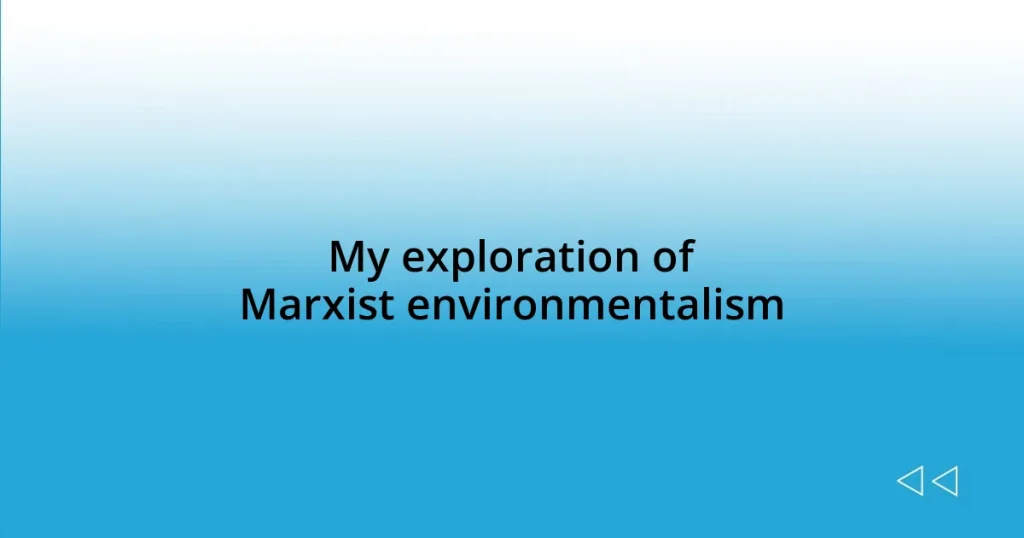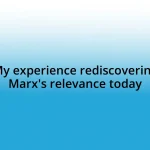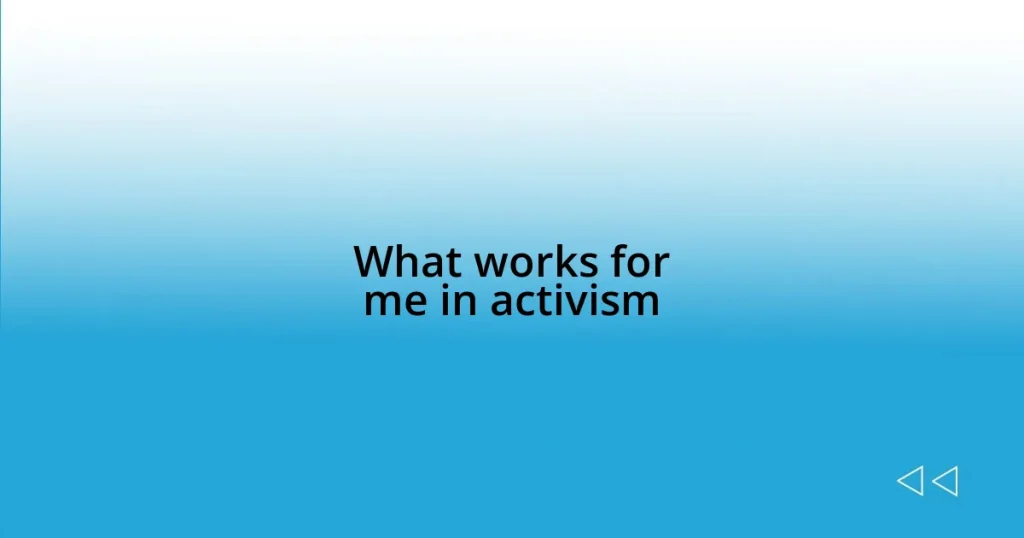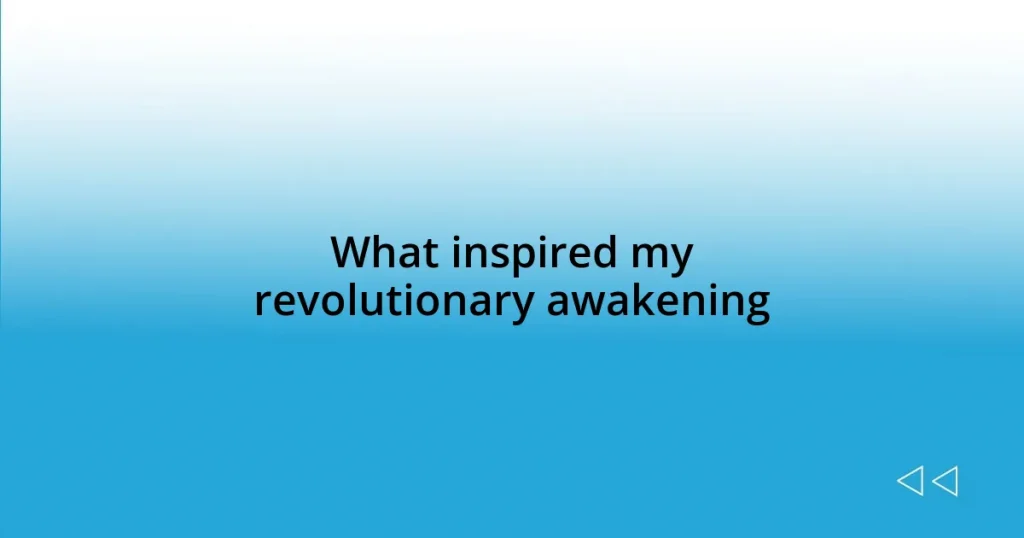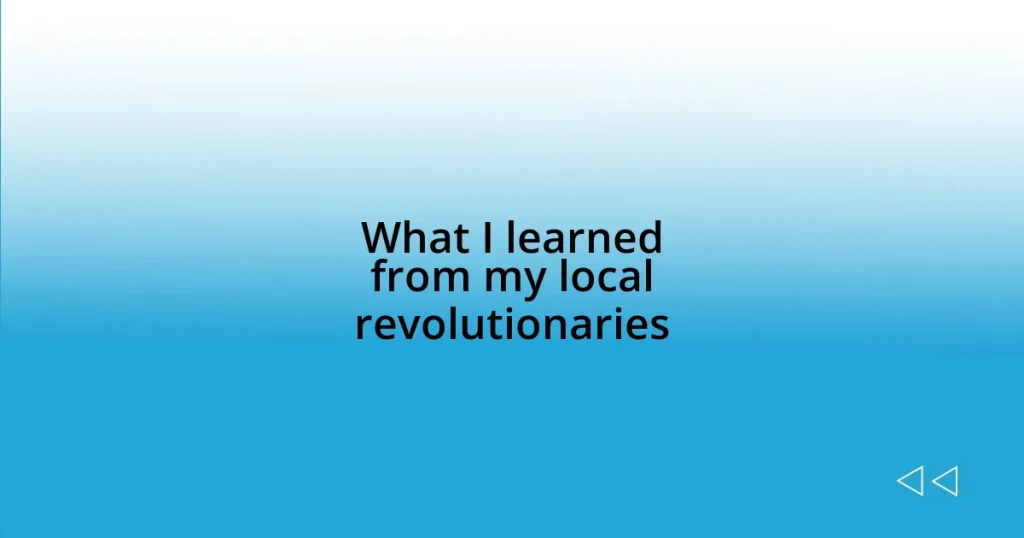Key takeaways:
- Marxist environmentalism critiques capitalism for prioritizing profit over ecological health, emphasizing the exploitation of both nature and marginalized communities.
- Historical context shows that social movements, such as the 1960s environmental activism, laid the groundwork for current ecological awareness and action.
- Collective community-driven initiatives and policy advocacy emerge as essential strategies for addressing environmental justice and combating capitalist exploitation.
- Future directions for environmental action include building coalitions among diverse movements, integrating eco-justice education, and redefining consumer culture to promote sustainability.
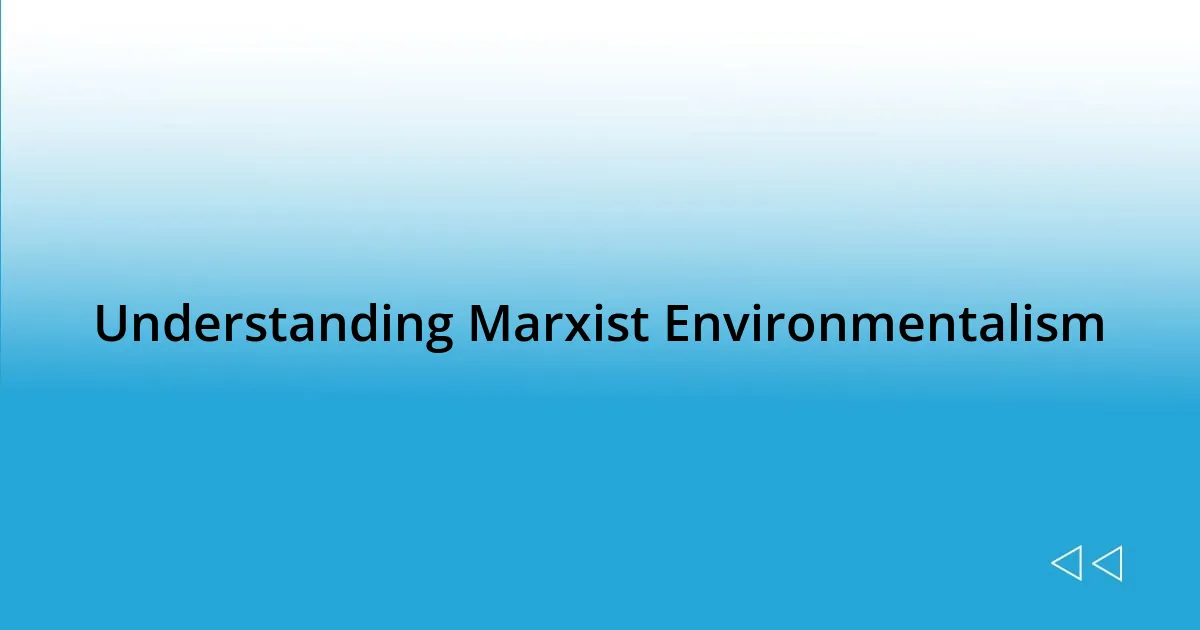
Understanding Marxist Environmentalism
Marxist environmentalism presents a compelling critique of the current capitalist systems and their role in environmental degradation. From my perspective, it’s startling how economic interests often overshadow ecological concerns, leading us to think: how can we prioritize short-term profits over the health of our planet? I vividly remember a discussion with a friend who worked in corporate sustainability; we both felt frustrated by the limitations imposed by profit-driven motives on meaningful environmental initiatives.
One of the central tenets of Marxist environmentalism is the concept of exploitation—not just of workers, but of nature itself. This notion often resonates with me during hikes where I witness the stark contrast between flourishing ecosystems and areas ravaged by industrial pollution. It begs the question: is our quest for progress merely a façade that conceals the deeper, damaging consequences of our consumption habits? When I reflect on this, I realize it’s imperative to acknowledge not just our economic structures but the very fabric of societal values that underpin our interaction with the environment.
Additionally, Marxist environmentalism calls for a collective approach to ecological issues, suggesting that solutions lie in cooperative efforts rather than individualistic, market-driven strategies. I often recall attending a community meeting focused on local conservation efforts, where everyone contributed ideas. It was invigorating to see how collaboration can foster a genuine sense of stewardship for our surroundings. Isn’t it fascinating how we can reshape our relationship with the earth by embracing a collective responsibility rooted in equitable principles? Understanding this connection can help us move toward more sustainable practices that honor both workers and the biosphere.
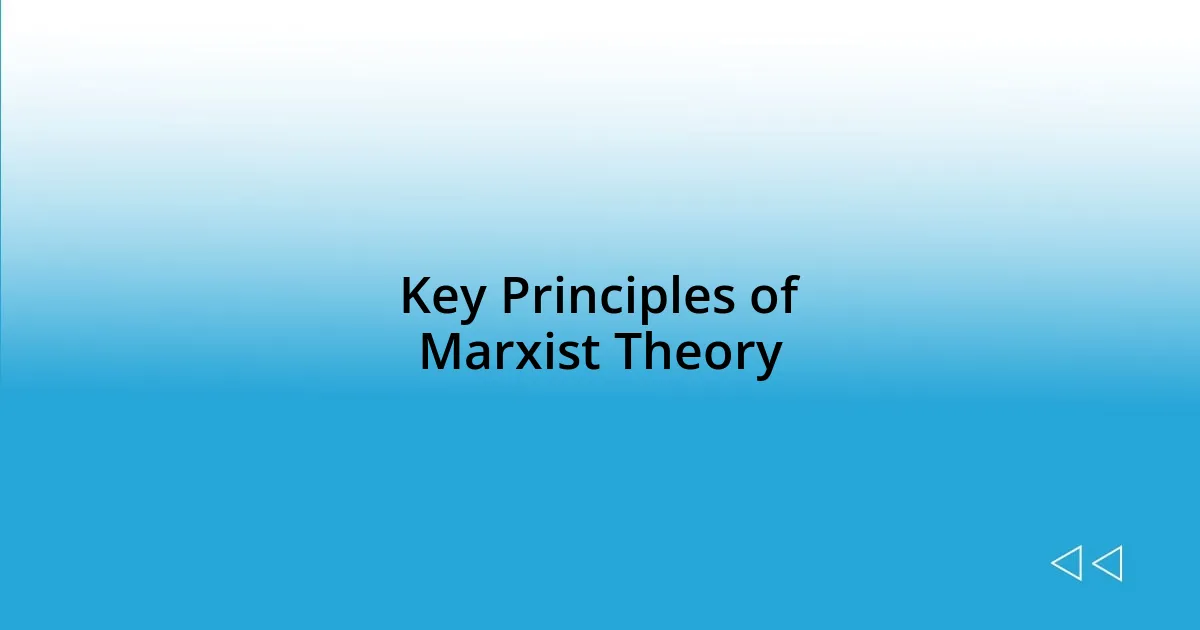
Key Principles of Marxist Theory
Marxist theory revolves around the idea of materialism, asserting that material conditions shape societal structures and consciousness. This perspective resonates with me deeply, especially when I think about how our economic activities directly influence environmental health. I’ve seen firsthand the impact of industrial practices on local ecosystems—it’s disheartening to witness a natural habitat’s degradation due to profit motives, making me question the long-term sustainability of such economic frameworks.
Another critical principle is class struggle, which highlights the conflict between those who own means of production and those who labor. I often think back to a workshop I attended on sustainable agriculture where a farmer shared her struggles against corporate farming giants. Her story illuminated how these economic disparities extend beyond the workplace, affecting environmental practices. It reminds me that the fight for environmental justice is intertwined with social justice, challenging us to rethink who gets to steer ecological initiatives.
Lastly, the idea of historical materialism emphasizes that societal change occurs through historical processes influenced by economic conditions. I sometimes find myself reflecting on how the lessons from the past can guide our future environmental policies. For instance, I naturally connect my love for historical documentaries with an understanding of how previous social movements laid the groundwork for current environmental awareness. Delving into this interplay between history and ecology invigorates my passion for advocating systemic change, urging all of us to recognize the role of our history in shaping a greener future.
| Key Principles | Explanation |
|---|---|
| Materialism | Economic conditions shape society and environment. |
| Class Struggle | Conflict between owners and laborers affects environmental policies. |
| Historical Materialism | Societal change is influenced by historical economic processes. |
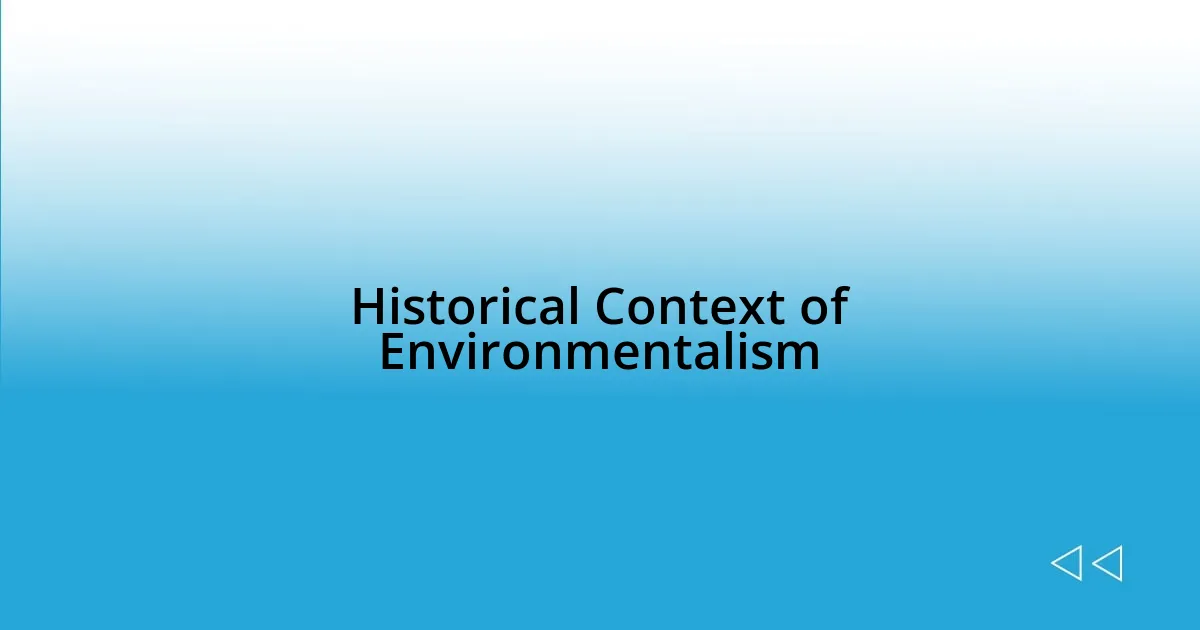
Historical Context of Environmentalism
Throughout history, environmentalism has ebbed and flowed, often reflecting social movements and political climates. I remember exploring the environmental movements of the 1960s and 70s in a college course; that period was a profound awakening for many people as they began to recognize the environmental impacts of industrialization. It’s fascinating to see how the Vietnam War and civil rights movements sparked broader concerns about pollution and nature conservation.
- The emergence of Earth Day in 1970 highlighted a growing awareness of ecological issues.
- The publication of Rachel Carson’s “Silent Spring” in 1962 raised alarms about pesticides and their dangers, serving as a catalyst for the modern environmental movement.
- The founding of environmental organizations like Greenpeace in the early 1970s focused on direct action and the protection of the natural world, marking a shift in how people approached ecological preservation.
From my perspective, the increasing visibility of these issues set the stage for a more conscientious relationship with the environment, although it remains a work in progress. The activism and awareness of those decades continue to resonate and inspire efforts today, showing that every small step can lead to more significant, collective action.

Capitalism’s Impact on Nature
It’s impossible to overlook how capitalism’s relentless quest for profit often conflicts with the well-being of our planet. I still remember visiting a once-thriving river that was reduced to a trickle due to industrial waste dumping nearby. Watching aquatic life suffocate in pollution was an eye-opener, leaving me to ponder: at what cost do we prioritize short-term economic gain over the health of our ecosystems?
In my experience, the commodification of nature under capitalism transforms everything into a resource to exploit, often leading to irreversible damage. I recall a hike through an area where a logging company was clear-cutting old-growth forests; the contrasting images of towering trees and barren land struck me deeply. This stark dichotomy makes me wonder, how do we reconcile our need for materials with the responsibility to preserve our natural heritage?
I’ve come to understand that the consequences of unfettered capitalism don’t just impact the environment; they also ripple through marginalized communities who bear the brunt of environmental degradation. A friend from a lower-income neighborhood shared her frustrations about the toxic air from a nearby factory, a stark reminder of the systemic inequities that capitalism can perpetuate. By delving into these personal stories, I can’t help but feel compelled to advocate for a more equitable approach that considers the environment as part of our collective social responsibility.
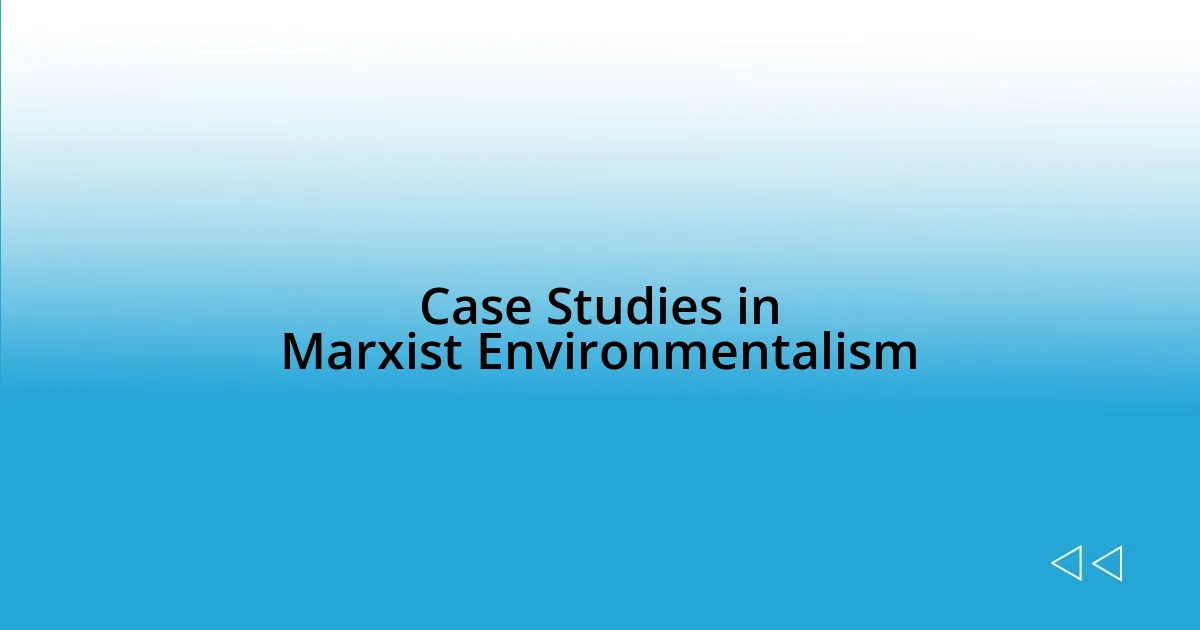
Case Studies in Marxist Environmentalism
Exploring case studies within Marxist environmentalism reveals some striking examples that illustrate the intersection of capitalism and environmental degradation. One striking instance is the struggle of indigenous communities in the Amazon against deforestation driven by multinational corporations. I vividly remember a documentary showcasing local leaders fighting to protect their ancestral lands. Their resilience shone through as they highlighted how the destruction of the rainforest not only threatened their homes but also the entire planet’s ecological balance. It left me wondering: how can we ignore the voices of those directly affected by ecological exploitation?
Another compelling case study is the struggle of the workers in the coal industry, who find themselves trapped in a cycle of dependency on a dying resource. I once participated in a town hall meeting in a coal mining community, where a local miner expressed deep concerns about both job security and environmental degradation. His words stuck with me; he talked about the fear of losing his livelihood while simultaneously witnessing the landscape he loved being scarred by strip mining. This duality is such a harsh reality, and it made me question how we can transition to sustainable practices without sacrificing the well-being of working communities.
The case of the Flint water crisis adds another layer to the discussion. The environmental injustice here is entrenched in systemic neglect that disproportionately affected marginalized populations. While researching this, I couldn’t help but feel a mix of anger and sorrow as I learned about community members rallying for clean water amidst political indifference. The question lingers: what does it say about our society when basic human rights, like access to clean water, become a luxury? Connecting these stories strengthens my belief that understanding these struggles through the lens of Marxist environmentalism can illuminate paths toward a more just and sustainable future.

Practical Applications and Solutions
When we look at practical solutions through the lens of Marxist environmentalism, community-driven initiatives emerge as powerful alternatives to exploitative practices. I remember attending a local urban farming workshop where residents transformed vacant lots into green spaces. The enthusiasm in the room was palpable; participants shared stories of how growing their own food not only fostered resilience but also created a sense of community ownership over their environment. This hands-on approach illustrates how collective action can directly challenge capitalism’s tendency to commodify our resources.
Additionally, advocating for policy changes that prioritize environmental justice can create significant shifts in how society interacts with nature. I once collaborated with a group on a campaign aimed at regulating water quality near industrial zones. Speaking with locals who had suffered from pollution-related health issues was a stark reminder of the real harm that negligence can inflict. Their voices fueled our efforts, emphasizing that it’s not just about protecting ecosystems but also about advocating for the rights and health of people who are often overlooked in policymaking.
On an even broader scale, embracing a circular economy presents an exciting avenue for sustainable practices. Reflecting on a visit to a company that employs this model, I was struck by how they repurposed waste materials and minimized resource usage. Observing this innovative approach left me pondering: Could we envision a world where economic frameworks are designed not just to grow profits but to regenerate the planet? This shift could radically alter our relationship with the environment, ultimately paving the way toward a more sustainable future rooted in equality.
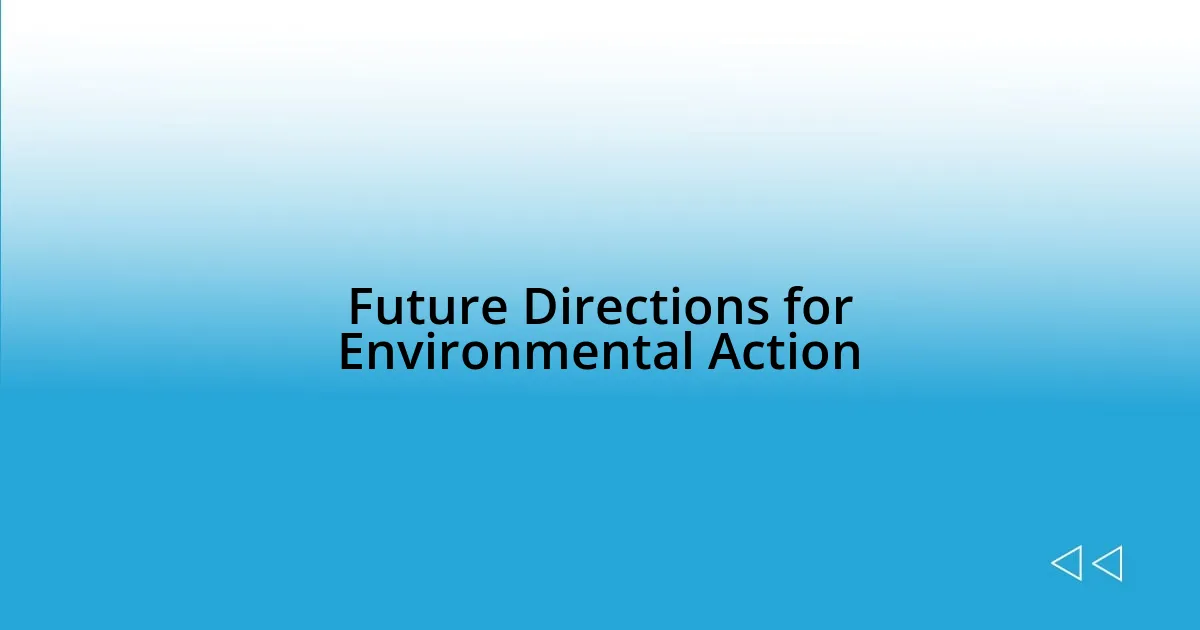
Future Directions for Environmental Action
Looking ahead, one of the most promising future directions for environmental action lies in building stronger coalitions among diverse social movements. I recall a memorable event where environmentalists, labor rights advocates, and Indigenous leaders came together to discuss shared goals. The energy in the room was electric, as it dawned on me how interconnected our struggles are. I couldn’t help but ask: what if we truly harnessed this collective power? Imagine the impact of uniting our voices to challenge the very systems perpetuating environmental degradation and social inequity.
Another avenue worth exploring is the role of education in fostering a more equitable environmental movement. During a recent workshop I attended, a passionate teacher shared her experience integrating eco-justice into her curriculum. Her students were not only learning about environmental issues but were also engaged in local solutions. It struck me deeply—could empowering young minds as active participants in sustainability be the key to lasting change? By equipping the next generation with critical thinking skills and social consciousness, we might ignite a transformative wave of activism that bridges ecological and social justice.
There’s also a compelling case for rethinking consumer culture and its relationship with environmental action. While scrolling through social media, I stumbled upon a campaign encouraging a “buy nothing” week. At first, I felt hesitant; could I actually resist the urge to shop? But as I tried it out, I realized how liberating it was to reflect on my consumption habits. This personal experiment brought to light an important question: how can we redefine success in a world often dictated by consumerism? Embracing minimalism and conscious living not only reduces our individual footprint but also challenges the capitalist framework that fuels environmental harm.











